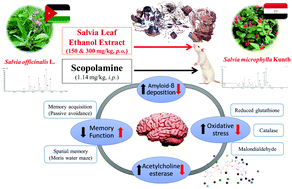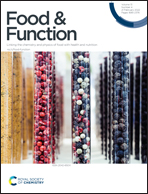Insights into the neuroprotective effects of Salvia officinalis L. and Salvia microphylla Kunth in the memory impairment rat model
Abstract
Salvia species have a longstanding traditional culinary use, mostly being consumed in the Mediterranean diet as a common herb added to food. Salvia is commonly consumed as a herbal tea for memory enhancement. Alzheimer's disease (AD) is the most prevalent form of dementia affecting people worldwide Therefore, the current research aimed to investigate potential therapeutic benefits of Salvia officinalis (SOL) cultivated in Jordan and Salvia microphylla (SML) cultivated in Egypt with regard to acetylcholinesterase activity, β-amyloid deposition and oxidative stress associated with scopolamine-induced AD. Metabolite profiling of the ethanol extracts of SOL and SML was performed using UPLC-ESI-MS/MS analysis. Methyl carnosate, carnosic acid, carnosol, rosmanol and salvianolic acids were the major secondary metabolites identified in SOL and SML extracts. In our study, scopolamine (1.14 mg kg−1, i.p.) was administered for 7 consecutive days to induce memory impairment in rats. SML and SOL (150 and 300 mg kg−1, p.o.) were tested for their effects to reduce the scopolamine-induced deficits. Donepezil (0.5 mg kg−1, i.p.) was used as a positive control. Scopolamine induced histopathological changes in rats’ prefrontal cortex and hippocampus in addition to β-amyloid plaque deposition. Furthermore, scopolamine treatment promoted oxidative stress and acetylcholinesterase activity. On the other hand, treatment with Salvia extracts corrected the histological changes induced by scopolamine and significantly reduced β-amyloid deposition. Moreover, both oxidative stress markers and acetylcholinesterase activity were ameliorated by Salvia treatment. Using virtual docking to the active sites of the human acetylcholinesterase crystal structure, salvianolic acid K, rosmarinic acid and salvianolic acid C showed the best fitting binding modes to active sites of acetylcholinesterase. Accordingly, the present study demonstrates the beneficial effects of Salvia species from Egypt and Jordan against scopolamine-induced AD-like disorder.



 Please wait while we load your content...
Please wait while we load your content...